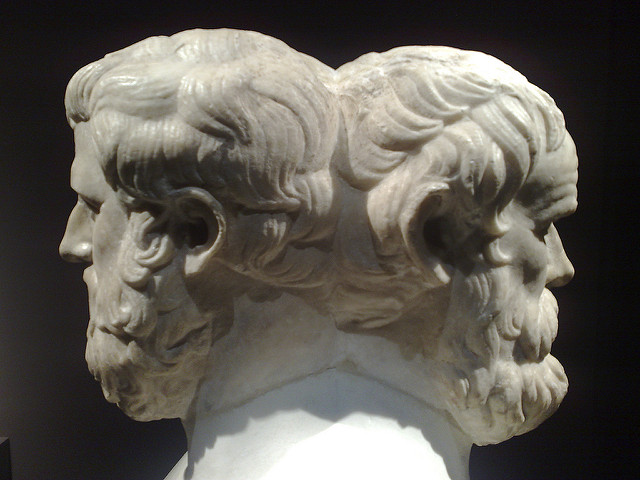
This is part 4 of a 5-part series, “Don’t Ask about ‘the Meaning of Life’ (An argument in five blog posts)”.
Part #4: Assessing the difference between meaning and purpose.
In the three previous posts, we saw that the question of the meaning of life is a late 19th Century invention, which effectively displaced what had previously been the dominant question about human life, namely its purpose or goal. Now we may take stock of the significance of this shift.
To suppose that the question of “the meaning of life” is a timeless, universal question, would be to insist that it captures what is formulated in terms of the question about man’s ultimate end or good or purpose. This would be very hard to sustain. The question of the purpose of life, if taken seriously, is intrinsically teleological and essentialist. It presumes that there is such a thing as true human fulfillment, rooted in human nature, which reflects a definite purpose or intention of its maker. In Aristotelian terms, the question implicates three of the four causes: in asking about the end (final cause) of man, it presumes that there is an essential human nature (formal cause), which has been communicated to man from an agent (efficient cause).
Put another way, to ask after the purpose or end of human life is at once to create a field for practical moral questions – How should we live? For what end should I act? – and to frame that field in the context of fundamentally metaphysical questions – what is the true origin, nature, and destiny of human beings? This is exactly what we see reflected in the the design of the whole of Aquinas’s Summa Theologiae – which places the moral reflection of the Secunda Pars (previously mentioned) in relation to God, as creator of human nature (explored in the Prima Pars), and Who alone can lead us to the fulfillment of our end (explored in the Tertia Pars).
By contrast, the question of the meaning of life almost seems formulated precisely to avoid both the moral field and metaphysical frame. Meaning is subjective, placing an emphasis on the interior life, feelings, emotions, awareness, consciousness. What makes me feel purposive doesn’t necessarily speak to the question of an intrinsic, essential purpose. “Meaning” does indeed suggest directionality – something is meaningful or significant if it makes reference to something else. But this is not the directionality of action toward an end, rather it is the directionality of symbol to what is symbolized. To ask about the meaning of life is almost to ask an aesthetic question: what will my life evoke, what will it represent?
As a consequence, notice what questions further arise after we open up the question of “the meaning of life”: is it the same for everyone, or a matter of individual perspective? Do we make meaning, or discover it? Do we entertain the possibility that there is no meaning? If my life feels meaningful to me, is it really meaningful? These are existentialist questions – questions of real moral seriousness, to be sure, but raised from a position disconnected from a moral or metaphysical framework. By contrast, notice what further questions arise from the question of the purpose or end of life: where does it come from? How can I achieve it? Is this or that action compatible with it? These are questions of theology and ethics – questions of moral seriousness strongly rooted in a metaphysical framework. The question of life’s meaning places an emphasis on subjective fulfillment; the question of life’s purpose can include that, but relates the notion of personal fulfillment to a question that draws one outside of oneself: what is my life for, how can I bring my life into its intended order. It is the difference between asking what might happen to make me feel fulfilled given my circumstances, and asking what should fulfill me in light of the true structure of reality.
So consider the kind of answers one could give to the old, more permanent question about the goal or end of life: virtue, happiness, union with God, life everlasting. “Why did God make you? God made me to know Him, to love Him, and to serve Him in this world, and to be happy with Him forever in heaven.” No wonder the authors of the Baltimore Catechism, like Thomas Aquinas, could use the question of human purpose to structure an instruction in Christian wisdom. Do answers like this even make sense as answers to the question of the meaning of life? One would have to say, in Kierkegaardian fashion, only if one chose to make the leap of faith, to believe those answers, to make them meaningful for you.
Alasdair MacIntyre has defended a teleological approach to ethics by connecting it to the possibility of making life intelligible as a narrative. This might sound like it is a version of making life “meaningful,” although MacIntyre strongly denies an easy equation between an Aristotelian purpose and existential meaning. Simply finding meaning cannot be the telos of life. True, if one is not aware of a purpose in one’s life, one will feel that one’s life is meaningless, but that doesn’t mean that “living a meaningful life” makes sense as the goal of life. MacIntyre is even willing to allow that Kierkegaard, for instance, did have a teleological view of life. Kierkegaard departed from Aristotle in his understanding of the mode of perceiving one’s actions as oriented toward a telos. MacIntyrean narrative is a kind of rationality, but Kierkegaard (as Tolstoy) was eager to place “meaning” outside of rationality. For Kierkegaard, man’s fundamental motives are more a matter of non-rational psychological mechanisms – hence Kierkegaard’s “ethical” reasoning is closer to “aesthetic” feeling than to more familiar forms of rational intelligibility.
So it is not a surprise that, even when taken seriously as the ultimate question of human life, it is widely recognized that the question of the meaning of life is highly personal. Unlike the question of the end of man, which is a general question about the essential good of human nature as such, the question of the meaning of life is individualistic and particular. The strength, and the weakness, of the question is that it seems to put the weight of responsibility on the one asking it to supply an answer from his or her own private, inarticulate resources.
As a consequence, those who take the question of the meaning of life most seriously seem to turn the question around, and make it less a question of abstract moral theorizing than a question of personal commitment. As earnestly characterized by Viktor Frankl, the question of the meaning of life seems to transform from a common question about human life, to a personal question about finding one’s unique vocation. Describing the challenge of life in the concentration camp, he says:
We needed to stop asking about the meaning of life, and instead to think of ourselves as those who were being questioned by life—daily and hourly. Our answer must consist, not in talk and meditation, but in right action and in right conduct. Life ultimately means taking the responsibility to find the right answer to its problems and to fulfil the tasks which it constantly sets for each individual.
These tasks, and therefore the meaning of life, differ from man to man, and from moment to moment. Thus it is impossible to define the meaning of life in a general way.
So even for Frankl, concerned as he is with helping to find meaning in the face of what could so easily seem meaningless, the question of the meaning of life admits of no general answer, and is not even the right question to ask.
Next: POST #5, EPILOGUE: THE MEANING OF LIFE AND THE CRISIS OF REASON
Joshua P. Hochschild is the Monsignor Robert R. Kline Professor of Philosophy at Mt. Saint Mary’s University.




